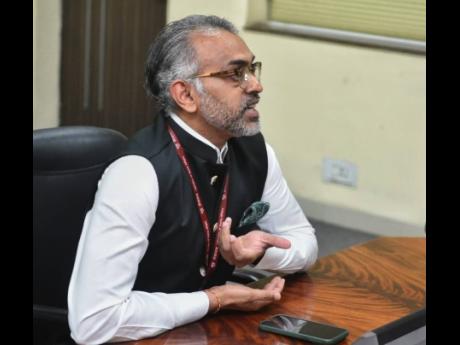Bridging the global digital divide
India urges region to embrace digitisation to propel SDGs success
NEW DELHI, India: With less than seven years remaining for United Nations (UN) member countries to realise their Sustainable Development Goals (SDGs), India is imploring developing countries in the Caribbean and Latin American to focus on...
NEW DELHI, India:
With less than seven years remaining for United Nations (UN) member countries to realise their Sustainable Development Goals (SDGs), India is imploring developing countries in the Caribbean and Latin American to focus on digitisation as a means of accelerating those targets.
Basking in the successes and transformation that India’s digitisation efforts have yielded, the country has also pledged to assist countries in the developing South.
“Digitisation is a process; it is not easy, but we are ready to assist our brothers and sisters in the developing South. We are still a developing country with our challenges, but this is something we feel could help countries accelerate the sustainable development goals,” said Nagaraj Kakanur, joint secretary of G20-I.
Recognising the global challenges countries faced, the UN had outlined 17 goals which could ensure a sustainable future if achieved by 2030. The goals, which include poverty and hunger eradication, decent work and economic growth, quality education, and affordable and clean energy, were adopted by world leaders at a 2015 UN summit.
Addressing a group of journalists from across the Caribbean and Latin America on a familiarisation visit last week, Kakanur noted that the pandemic, coupled with the ongoing war between Russia and Ukraine, has set back valuable and potential gains.
“A third of the world’s countries are in debt distress. They have practically lost all ability to service their debts, which, in turn, has huge implications on all human development indicators as well as SDGs,” he said.
However, while highlighting that India will be hosting this year’s staging of G20 Summit, Kakanur said that the country’s presidency has among its priorities ways in which to accelerate those goals, adding that digitisation is one such accelerator.
“We believe the digital dimension is something that must be focused on.
“There is a global digital divide. At the same time, people forget that there is an emerging global digital data divide. But today, every country, in order to meet their sustainable goals, needs to be backed up by data,” he said.
QUALITY DATA
At the same time, Kakanur said it is important for countries to ensure that they are not just generating data, but that the quality of the data is good.
“Quality data is something that you could derive only with the application of data analytics techniques and from data analytics techniques you need to have a very skilled workforce that has the ability to understand machine learning, artificial intelligence, and biodata.
“Unless you use these three you will not be able to harness something called actionable intelligence and as such none of your policies will be evidence-based, “ he warned.
Kakanur, however, pointed out that disaggregated data and evidence-based data, which is rooted in quality data are missing from the developing South.
India, he added, is, therefore, heavily focused on how the developing South can harness digital transformation.
He then pointed to India’s revolutionary use of digitisation.
“Today, I think the psychological barrier has been crossed because what we have done in India is that practically 100 per cent of all adults in India today have biometric digital identity cards,” said Kakanur.
“All of them have something called unique identity numbers and we have mapped that number with your biometrics and what has happened is that you have linked a billion plus people to a billion bank accounts and so this is completely transformational and is something called a foundational digital public infrastructure,” he said, noting that other models can be built on this.
Kakanur shared that India over the last three years, has created 60 per cent of the global bank accounts, and 416 million bank accounts over seven years, of which 55 per cent were by women, a major accomplishment for female empowerment.
Additionally, he said that this single initiative has also helped the country to achieve two to three per cent economic growth during the pandemic as it resulted in $250 billion being pumped into the formal financial system.
“Everybody thought you need to be approved to have a bank account; India reversed it. The government here said, ‘No. You are a person, you deserve to have a bank account irrespective of the fact that you maintained a zero balance’, and when everybody felt that they had a bank account, it forced them to pull out their savings, which they had in hiding in their homes, [and put them] into the financial system.”
Another major digitisation accomplishment for the country is the move from physical currency to digital money.
“So today that transition has happened, so the smallest of vendors who are going to sell fruits, flowers or vegetables on the street can access money on his phone and is very happy. Previously, he uses to hide it under his pillow. Everybody used to hide money somewhere because they are very, very insecure,” he added.
The joint secretary said that India has bought into the entire concept of digitisation, including digital health, digital education, and digital culture, and it is something that every country should do to avoid the infrastructure bottleneck.
In the meantime, he said any nation that wants to get into biometrics or digitisation needs to ensure that there is a concerted effort to establish a very effective framework and that there is enough government regulation to allow for data privacy, along with a component for the private sector to partner with innovations.
“Digitisation is just the beginning. Giving identity cards to everyone is just the first goal, but the goal should have a kind of futuristic attempt to see what you can make out of the digital identity, so that must be the biggest thing,” he noted.

